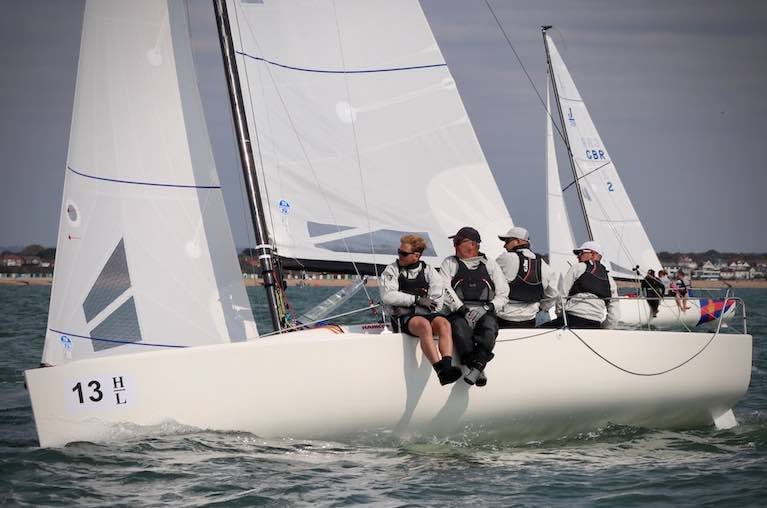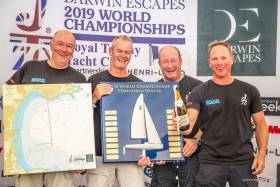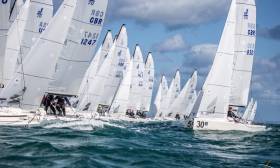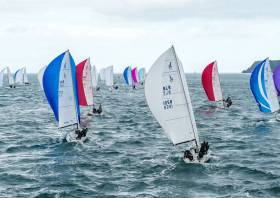Displaying items by tag: J70
Irish J70 'Team Wildcard' Places Sixth at Primo Cup, Monaco
The 40th edition of the Primo Cup was recently held at Yacht Club De Monaco, where fifty J70s competed.
Other fleets included Cape 31, Smeralda 888 and Longtze Premier, representing over ten countries.
In the J70 class, Ireland’s Team Wildcard, with a crew consisting of William Twomey, Richie Harrington, Marshall King, and Mario Segers, placed sixth overall. There was a solid Corinthian performance, with five boats inside the top 10. Wildcard placed 3rd in the Corinthian division. Local favourites G Spot successfully defended their title this year and were crowned champions.
Wildcard has a busy season ahead, including the European Championships in Italy and the Worlds in Palma.
Royal Cork J70 'Antix' Crew Racing at Bacardi Cup, Miami
Three back-to-back races for the forty-nine boat J/70 fleet saw Anthony O'Leary's skippered 'Antix' succumb to a black flag penalty in race four of the Bacardi Cup in Miami, Florida on Friday.
Crewed by Ben Field, Harry Durcan and son Nicholas O'Leary, the foursome is the second Irish boat competing on Biscayne Bay, with another son, Peter O'Leary, sailing with Stephen Milne competing in the Star keelboat class.
The usual shifty breeze was around 8-10 knots with plenty of race track nuances.
The OCS penalty has not helped the overall standings with Royal Cork's Antix lying 32nd overall.
Laura Grondin’s ‘Dark Energy’ team stormed to the top of the leaderboard, from 13th at the start of the day, with scores of 2,1,5.
Brian Keane’s ‘Savasana’ also advance through to second overall, up from 7th, just one point adrift of Grondin. Margaret McKillen’s ‘Magatron’ remains in third overall.
The hot favourites on ‘Brutus III’ have failed to connect the dots in this series, although Charles Thompson’s team managed to win in the final race, giving some salvation to their otherwise challenging scorecard.
Provisional Results – Top 3 after Race 6
1. Laura Grondin / Taylor Canfield / Luke Muller / Malcolm Lamphere (USA 819) - 34 pts
2. Brian Keane / Thomas Barrows / Ron Weed / Conner Harding (USA 49) - 35 pts
3. Margaret McKillen / Orrin Star / Brian Kamilar / Dave Schreiner (USA 1523) – 45 pts
Wildcard On Form at First J/70 Corinthian World Cup
Wildcard took 13th overall out of 75 boats at the inaugural J/70 Corinthian World Cup on Lake Garda earlier this month.
This was a remarkable result especially for young helm Harry Twomey as it was his first time back sailing after sustaining serious injuries in a car crash while attending the Sailing Intervarsities earlier this year.
Due to his injuries, Harry helmed with restricted use of his right hand and a slight adaptation of the stick to make it easier for him to drive, making the result an even more amazing achievement.
The J70 Corinthian Cup from 1-4 June at Riva del Garda was the first event in the history of the class exclusively dedicated to Corinthian crews.
Seventy-five crews from 20 countries were greatly challenged for the first two days of the event by the famous Lake Garda wind, “Ora”.
Due to a lack of wind for the final two days there was no racing on those days. This was disappointing for the Irish team who were hoping to build on the strength of their performance on the first two days of the event.
 Team Wildcard (from left): Richie Harrington, William Twomey, Sally O’Flynn and Harry Durcan and Harry Twomey
Team Wildcard (from left): Richie Harrington, William Twomey, Sally O’Flynn and Harry Durcan and Harry Twomey
Winners of the inaugural event were the Italian team White Hawk with two bullets, a second and a third place. The silver medal went to Irrational Exuberance from Estonia and the bronze went to the Australian crew of Celestial.
Wildcard’s crew scorecard included a third and an eighth place in the six-race series.
The Royal Cork Yacht Club team made up of helm Harry Twomey, Richie Harrington, William Twomey, Sally O’Flynn and Harry Durcan will now turn their intentions to the J/70 Europeans in Weymouth this September.
Speaking about their experience in Lake Garda, Wildcard owner William Twomey said: “Coming out here to compete against 75 J/70 crews sharing our passion was an amazing experience.
“The icing on the cake was seeing my son [Harry] back on the water again. He has spent a very gruelling four months in recovery, having undergone several surgeries due to the injuries he sustained in a car crash last February and is facing many more months of rehab as his recovery from the accident in still ongoing.
“Instrumental to how well he performed was the support of the amazing Wildcard team who have now been with team Wildcard for a number of years. They are a fantastic group of sailors who all stepped in and went above and beyond to help Harry who has a number of restrictions due to his injuries.
“Our goal going to Italy was to get Harry back on the water, we are thrilled to have achieved 13th place in the World [Cup].”
Royal Cork's 'Wildcard Racing' are Flying the Irish Flag at the J70 World Championships
Royal Cork Yacht Club's Wildcard Racing are flying the tricolour in at this year's J70 World Championships this week from October 17 to 22nd.
Wildcard is being helmed by Trinity College Dublin student Harry Twomey. At 19 years of age he is the youngest helm at the event this year.
Taking a place on the leaderboard for Wildcard Racing will not be easy as they are up against 90 international teams from 23 nations who have descended on the Principality of Monaco for this years J70 World Championships in the quest for glory.
The qualifying process has ensured the quality of the fleet and guarantees to be a week of exceptional sailing and high competition. Among the 90 crews are World Champions in this class, such as Luis Bugallo, Marshall King, Ian Wilson, Peter Duncan, Jud Smith and Paul Ward. Alongside are stars on the European scene set to put up a fight with the likes of Italian Luca Domenici, the Dane José María Torcida Seghers and British sailor Jonathan Calascione.
Every J70 World Championship is a battle of the very best to the end. This years event in Yacht Club de Monaco will be no exception with 400 experienced sailors roaming the quays. Amongst them the Irish flag will fly over Wildcard Racing and Harry Twomey, William Twomey, Richie Harrington and Cian Byrne from the Royal Cork will be hoping to repeat their form from last year when they won the Monaco the 2022 J70 Winter Series in the Corinthian division.
Last weekend saw Royal Cork Yacht Club Team Wildcard take another podium finish at the Monaco Sports Boat Winter Series, Primo Cup-Trophee Credit Suisse, the flagship winter event organised by Yacht Club de Monaco.
For Team Wildcard there were two prizes to aim for as the Primo Cup doubles as the fourth and final act of the Monaco Sportsboat Winter Series of monthly regattas.
The last event of the four event series’ saw 81 J70s from 16 nations compete in Monaco for the final regatta in the principality prior to the 2022 J70 worlds which will take place there next October.
After four events over the winter months and three final days of very close racing in a variety of conditions, team Wildcard finished in 7th place overall and 2nd Corinthian team in the Primo Cup. Some big names were at the event and these included past J70 world champions and Americas cup sailors scattered across the highly competitive fleet.
This meant team Wildcard won the 2022 J70 Monaco Sportsboat Winter Series in the Corinthian division and came 4th overall for the series.
The result is a major result for the Irish team who had to keep a cool head going into the last event of the series in first place. Their competitors kept the pressure on but in the end, the Irish team showed their strength and knowledge of the J70 and delight at being back out competing after two years of Covid.
William Twomey said, “I am thrilled with the win and looking forward to the Europeans and Worlds”.
The team now go onwards to the Italian J70 summer series in Punta Ala and Lake Garda to name a few stop-offs before the Europeans in France and the Worlds next October also on the med in Monaco.
Wildcard will be hoping for continued success in the Corinthian category at these two major regattas that will have 100 teams.
Cork Harbour's J70 Team Wildcard Move to Sixth Overall in the Monaco Sportsboat Winter Series
The Cork Harbour based J/70 Team Wildcard has finished tenth place in a fleet of nearly 60 boats in the penultimate act of the Monaco Sportsboat Winter Series.
The team consisted of Neil Hegarty (Helm), Richie Harrington (Main/Tactics), Patrick Crosbie (Trimming), William Twomey (Pit/ Trimming) and Alana Twomey (Bow).
Wildcard now leads the Corinthian division as they head into the final act of the sports boat winter series in March (Primo Cup).
It is anticipated that there will be up to 90 entries in a competitive fleet that attracts sailors from all corners of the globe, including Olympic Medalists and America’s Cup sailors.
Team Wildcard is bidding to represent Ireland in the J70 World Championships taking place in Monaco this coming October with a fleet capped at 90 boats.
Royal St. George's Marshall King Fighting to Defend J70 UK National Title on the Solent
Dublin Bay and Greystones sailor Marshall King of the Royal St. George Yacht Club, who is the corinthian World Champion in the J70 class, has some work to do in the Class's British National Championships if he is to move up from sixth in IRL 1123 'Soak Racing' to retain the national title in the final three races on the Solent today.
The Solent is a tricky place to sail, especially when the wind is all over the place. Uber wind shifts postponed the start of the second day of the J/70 UK National Championships, but once the wind direction stabilized, three windward leeward races were hard fought for the 22-strong fleet. Paul Ward’s Eat Sleep J Repeat took a brace of bullets to lead the regatta by two points. Graham Clapp’s Jeepster scored a 1-2-1 to move up to second. Martin Dent’s Jelvis drops to third but is still in with a shot at the title going into the final day.
 22 teams are competing for the 2020 J/70 National Championships Photo: Louay Habib
22 teams are competing for the 2020 J/70 National Championships Photo: Louay Habib
Eat Sleep J Repeat’s Ruairidh Scott is a World Champion in the J/70, J/80 and J/111 classes, and commented after racing: “It wasn’t easy in a competitive fleet, especially upwind when the chop gets going, it is challenging to keep the speed up. Crew weight, technique and also mast rake has a big influence on performance. This fleet is spirited and upwind there is not a lot in it. However, the first downwind leg today, we were the first boat to go into wing-on-wing, and that got us away.”
Ben Saxton, NACRA 17 World Champion, has been racing in the J/70 Class for four years, Ben is part of Graham Clapp’s crew on Jeepster. “To win in the J/70 Class, you need good teamwork,” commented Saxton. “If you start well and you are quick enough, then you can bring your tactics into play. We are pretty stacked for weight, so quick upwind but not as fast downwind. We have been working on downwind technique and we are getting faster, which shows in the results. We have worked hard to get it right and we passed Eat Sleep upwind today for our win, so that was a good feeling.”
Tales from the J70 Peloton
Patrick Liardet’s Cosmic is currently lying in 12th position with a crew of young talented sailors including; son Freddie, Jack Hanslope and Richard Anderton. On the racecourse and in the results, Cosmic is mixing it with sailors from the Olympics, World Champions and top professional sailors.
“It is the first time we have all sailed together and mixing it up in the fleet has been good fun,” commented Patrick. “This is a very tough fleet with strong sailors, and it’s tremendous. Richard is a World Champion Fireball crew, Freddie is very strong in dinghies and keelboats and Jack is his friend from Uni’ who is a great team racer. The boats are evenly matched, so you are really fighting for every place, all the way down the fleet.”
Racing at the J/70 UK National Championship concludes Sunday 13th September with three races scheduled in The Solent.
Results here
Greystones Sailor Marshall King Becomes J/70 Corinthian World Champion
Greystones helmsman Marshall King from County Wicklow but who lives in the UK has won the J/70 Corinthian World Championship in dramatic style on Soak Racing yesterday. In the last race, Soak Racing was four places ahead of Doug Struth (GBR) racing DSP. A tie on points for the series was settled by countback, a single place after 14 races gave Soak Racing victory. Denis Cherevatenko (RUS) racing Joyfull was third. Fiona Hampshire (GBR) racing Elizabeth was best Corinthian Woman Helm in the championship.
“Amazing, we have been trying to win this for six years, so it feels just amazing. Torbay has been exceptionally tricky, and we have had great competition at a really well-organised regatta, and it is great to come away with the win. Today's racing was really exciting, we were 10 points behind DSP going into the last two races. We had an excellent Race 13 and then it was about staying with DSP and making sure there were not too many boats between us. It all came down to the last 100 metres, and we did just enough.”
The Darwin Escapes 2019 J/70 World Championships Awards Ceremony was held in the Event Marquee. Event Director Bob Penfold introduced Admiral of the Royal Torbay Yacht Club, Nigel Wollen to present the prizes and winners trophies. Darwin Escapes Chief Executive Anthony Esse described the event as a “complete triumph” and showing gratitude to Bob Penfold generously announced a free holiday at Darwin Escapes for Bob and his wife Sue. GAC Pindar represented by Andrew Pindar, who has been sponsoring sailing events for 39 years, was also invited to the stage and was full of praise for an amazing regatta.
The Royal Torbay Yacht Club and their dedicated volunteer support were roundly applauded by all of the J/70 sailors for producing a fantastic regatta. Stuart Childerley and the Race Management team received huge applause for providing high-quality race courses in tricky conditions.
Wilson & King Take Corinthian Lead On Third Day Of J/70 Worlds
Marshall King and Ian Wilson’s Soak Racing was the new leader in the Corinthian class after posting 2-34-9 yesterday (Wednesday 4 September) in the Darwin Escapes 2019 J/70 World Championship, writes Louay Habib.
The Greystones-linked pair’s performance saw Doug Struth (GBR), racing DSP, drop to second in the standings. Denis Cherevatenko (RUS) racing Joyfull retains third but is under pressure from a top performance today by Charles Thompson (GBR) in Brutus.
“It is really difficult to track the boats in the Corinthian fleet because we are all out on one race course and we are racing against the pros and we can give them a really good run for their money but we do keep an eye out for our mates from Hamble, DSP, if we are in front of them, we know we are doing well,” said Ian Wilson, who is also J/70 international class president.
“It was brilliant today, blowing 20 knots, wind all over the place, a great day out with boats hooning all over the place – just great fun. We are hoping for more of the same tomorrow, big breeze and great racing in Tor Bay.”
Indeed, the breeze piping in from the north created full-on battle conditions for the 20 nation fleet on Wednesday, and for the third consecutive day both the Corinthian and Open leaders have changed.
In the Open class, Paul Ward (GBR) and Eat, Sleep, J, Repeat scored a 1-4-15 to take the overall lead, and Pichu Torcida (ESP) racing Noticia has climbed to second after scoring a 5-17-6.
Joel Ronning (USA) racing Catapult, dropped to third after scoring 14-14-10., while yesterday’s leader Alberto Rossi (ITA), racing Enfant Terrible, started the day well posting 9-8 but a 28 in the last race after broaching out drops Enfant Terrible to fourth.
Teams from nine nations occupy the top 10 places after a day that also race wins for Henry Brauer (USA) on Rascal, and Carlo Alberini (ITA) racing Calvi Network.
Marshall King from Greystones and Ian Wilson’s Soak Racing followed up their Corinthian UK National title win at Royal Torbay last week with a strong start in the Darwin Escapes 2019 J/70 World Championship at the same venue, writes Louay Habib.
The event kicked off yesterday (Monday 2 September) with three races in Torbay, where big wind shifts and changes in wind speed tested the 78 teams competing as well as the race management team led by Stuart Childerley.
In the Corinthian class, Patrick Liardet (GBR) racing Cosmic ended the day leading by just one point from Doug Struth (GBR) racing DSP.
Wilson & King (IRL) completed a trio of British Isles boats leading the championship for the Corinthian title. There were also race wins for Pichu Torcida (ESP) racing Noticia, Reg Lord (AUS) racing Juno, and Nelson Mettraux (SUI) racing CER Aprotec–Ville de Genève.
In the Open class, Joel Ronning (USA) racing Catapult, led the championship after three races. Second was Claudia Rossi (ITA) racing Petite Terrible, which recovered from a 28th place in Race 1 to post two podium finishes. Andrey Malygin (RUS) racing Maria was third.
































































